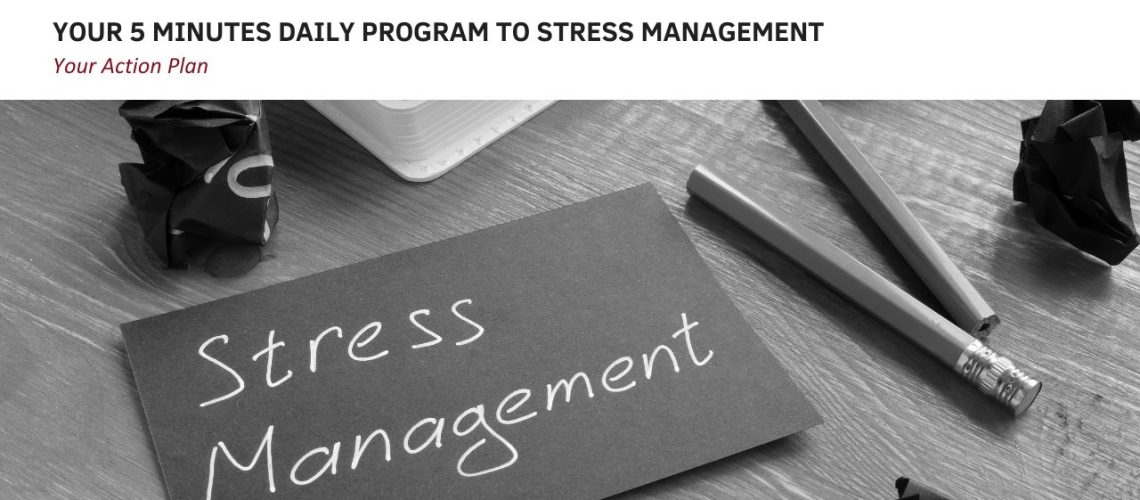By Dr. Salam Slim Saad
Feeling stressed out lately? You’re not alone. Stress seems to be an unavoidable part of part of modern life, hiding around every corner, ready to strike when we least expect it.
We all have our preferred expressions for describing stress, and while I won’t list them all (since they vary across languages), the feeling is universal. It’s remarkable how, even during moments of relaxation or boredom, stress can sneak up on us. Have you ever experienced that contradiction?
Since stress is an unavoidable part of life, finding ways to reduce and prevent its occurrence is essential. Just like our daily routines of brushing our teeth or eating breakfast, managing stress should become a natural part of our lives. Every minute counts, so here are some practical strategies to help minimize stressful incidents and our negative reactions to them. Let’s dive in and reclaim control over our well-being.
Time Management: Maximizing Efficiency and Minimizing Stress
Managing your time effectively is key to reducing stress and improving your overall well-being. Here are some practical tips to enhance your time management skills:
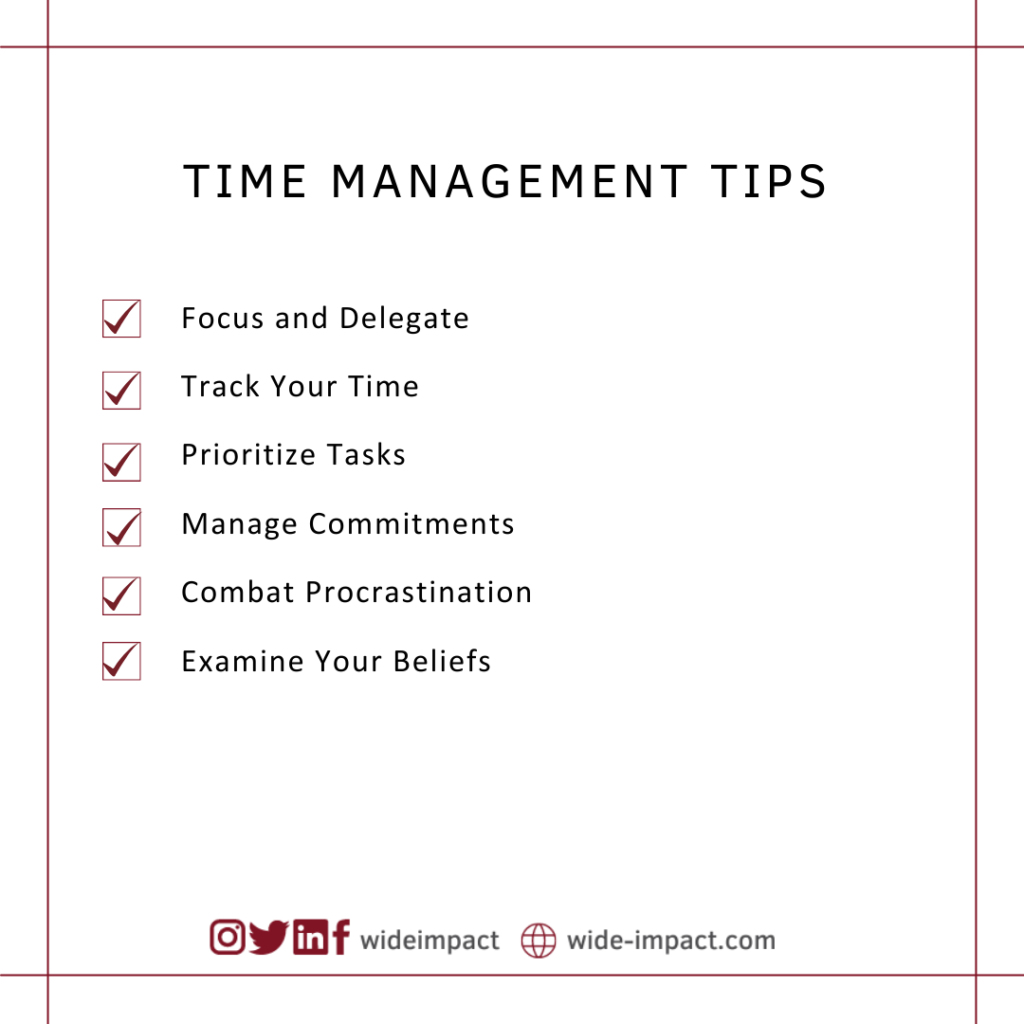
- Focus and Delegate: Save time by concentrating on one task at a time and delegating tasks when possible. This allows you to prioritize your workload and free up valuable time for yourself.
- Track Your Time: Keep a record of how you spend your time, including work, family, and leisure activities. This helps you identify areas where you may be wasting time and allows you to adjust accordingly.
- Prioritize Tasks: Rate tasks by importance and urgency, and redirect your time to activities that align with your priorities and values. This ensures you’re spending time on what truly matters to you.
- Manage Commitments: Avoid overcommitting yourself by saying no to tasks or activities that aren’t important to you. This prevents you from spreading yourself too thin and feeling overwhelmed.
- Combat Procrastination: Use a day planner to schedule tasks, break large projects into smaller, more manageable tasks, and set short-term deadlines to stay on track and avoid procrastination.
- Examine Your Beliefs: Reflect on your beliefs and values to reduce conflict between your aspirations and reality. This helps you align your actions with your goals and leads to a more fulfilling life.
Lifestyle Choices: Creating a Foundation for Stress Resilience
Lifestyle choices play a crucial role in managing stress levels, impacting how effectively our bodies cope with daily pressures. Here are some practical tips to incorporate into your lifestyle:
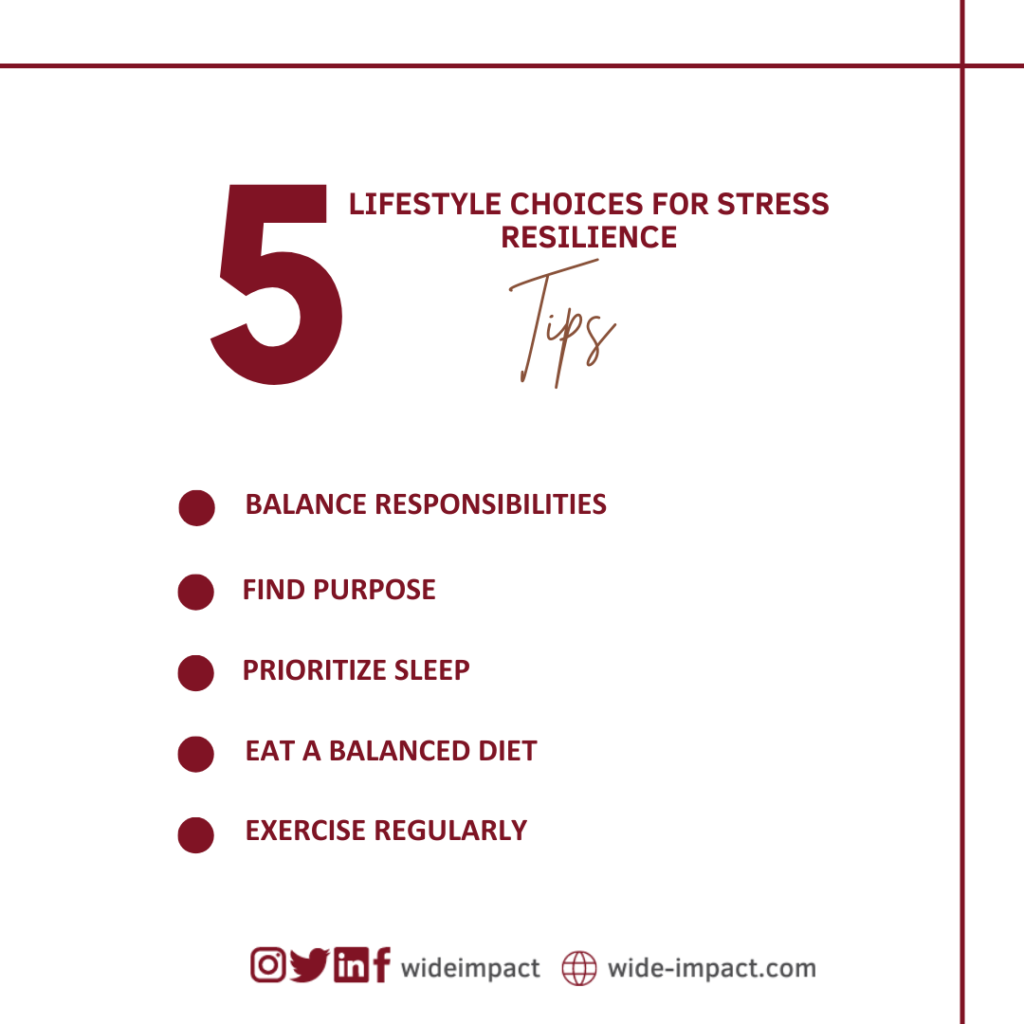
- Balance Responsibilities: Strive to balance personal, work, and family obligations to avoid feeling overwhelmed. Prioritize tasks and allocate time for each aspect of your life, ensuring none take precedence over the others.
- Find Purpose: Cultivate a sense of purpose in life by setting meaningful goals and aligning your actions with your values. A clear sense of purpose can provide motivation and resilience in facing challenges.
- Prioritize Sleep: Ensure you get enough quality sleep each night to allow your body to recover from the day’s stresses. Establish a relaxing bedtime routine and create a comfortable sleep environment to promote restful sleep.
- Eat a Balanced Diet: Fuel your body with a balanced diet rich in fruits, vegetables, whole grains, and lean proteins. Proper nutrition provides your body with the energy and nutrients it needs to cope with stress effectively.
- Exercise Regularly: Incorporate moderate exercise into your weekly routine to reduce stress and promote overall well-being. Whether it’s a brisk walk, a yoga class, or a gym session, find activities that you enjoy and make them a regular part of your schedule.
Social Support: The Power of Connection in Stress Management
Social support plays a crucial role in how we manage stress. It encompasses the positive reinforcement we receive from our social circles, including family, friends, and community. Knowing that you’re cared for, valued, and supported can significantly impact your mental and physical well-being. Numerous studies have highlighted the profound relationship between social support and overall health. To harness the benefits of social support:
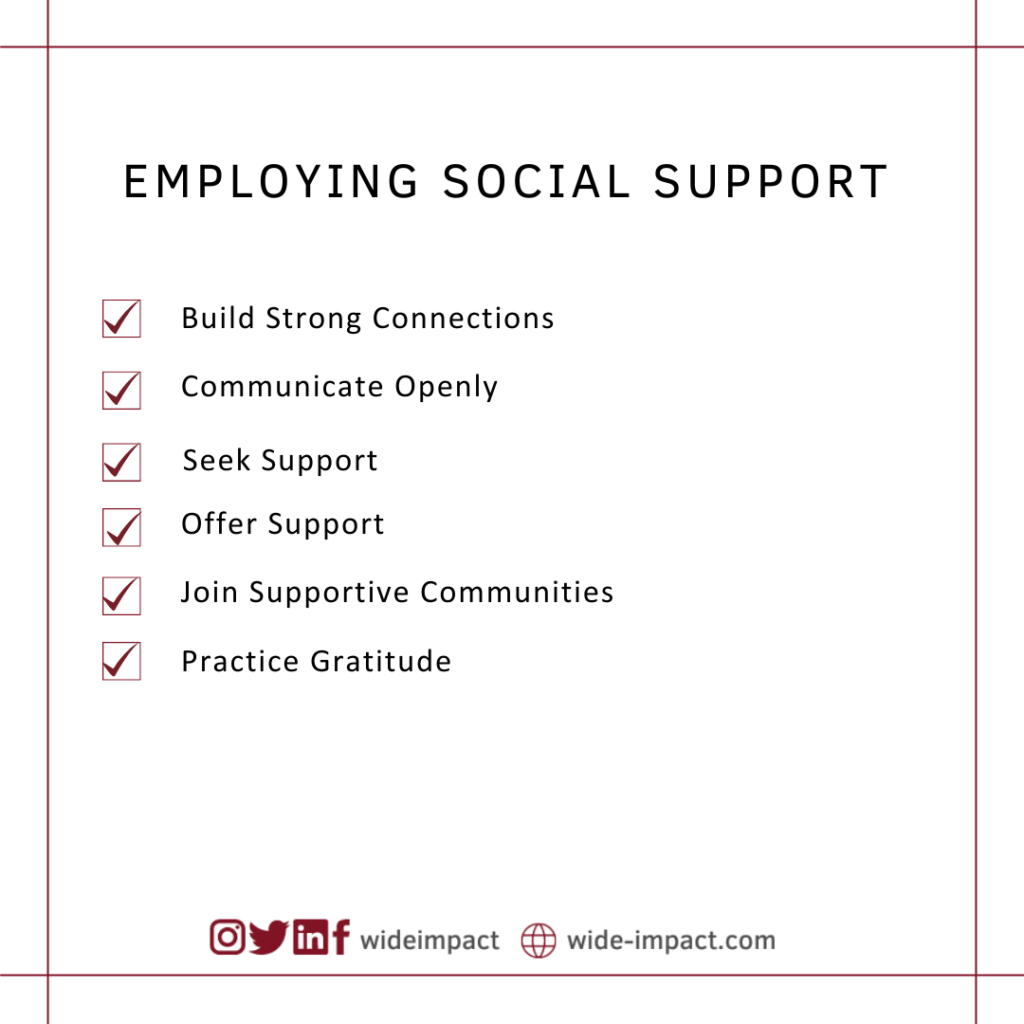
- Build Strong Connections: Cultivate meaningful relationships with family, friends, and peers. Invest time and effort into nurturing these connections to create a supportive network.
- Communicate Openly: Don’t hesitate to reach out and share your feelings with trusted individuals. Open communication fosters understanding and strengthens bonds, providing a sense of validation and comfort.
- Seek Support: Don’t be afraid to lean on others during challenging times. Reach out to friends or family members for guidance, encouragement, or simply a listening ear.
- Offer Support: Be there for others in their times of need. Extend a helping hand, lend a sympathetic ear, or offer words of encouragement to show your support and solidarity.
- Join Supportive Communities: Engage in groups or organizations that align with your interests and values. Participating in supportive communities can provide a sense of belonging and camaraderie, boosting your overall well-being.
- Practice Gratitude: Express gratitude for the support you receive from others. Take time to acknowledge and appreciate the positive impact that social connections have on your life.
Changing Thinking: Transforming Negative Thoughts into Positive Action
Addressing negative thinking patterns is crucial for managing stress effectively. When faced with challenging events, negative thoughts can trigger a cascade of emotions like fear, anxiety, and insecurity, amplifying our stress levels. However, by actively working to change our thought patterns, we can regain control and reduce stress. Here are some practical tips to help shift your mindset:
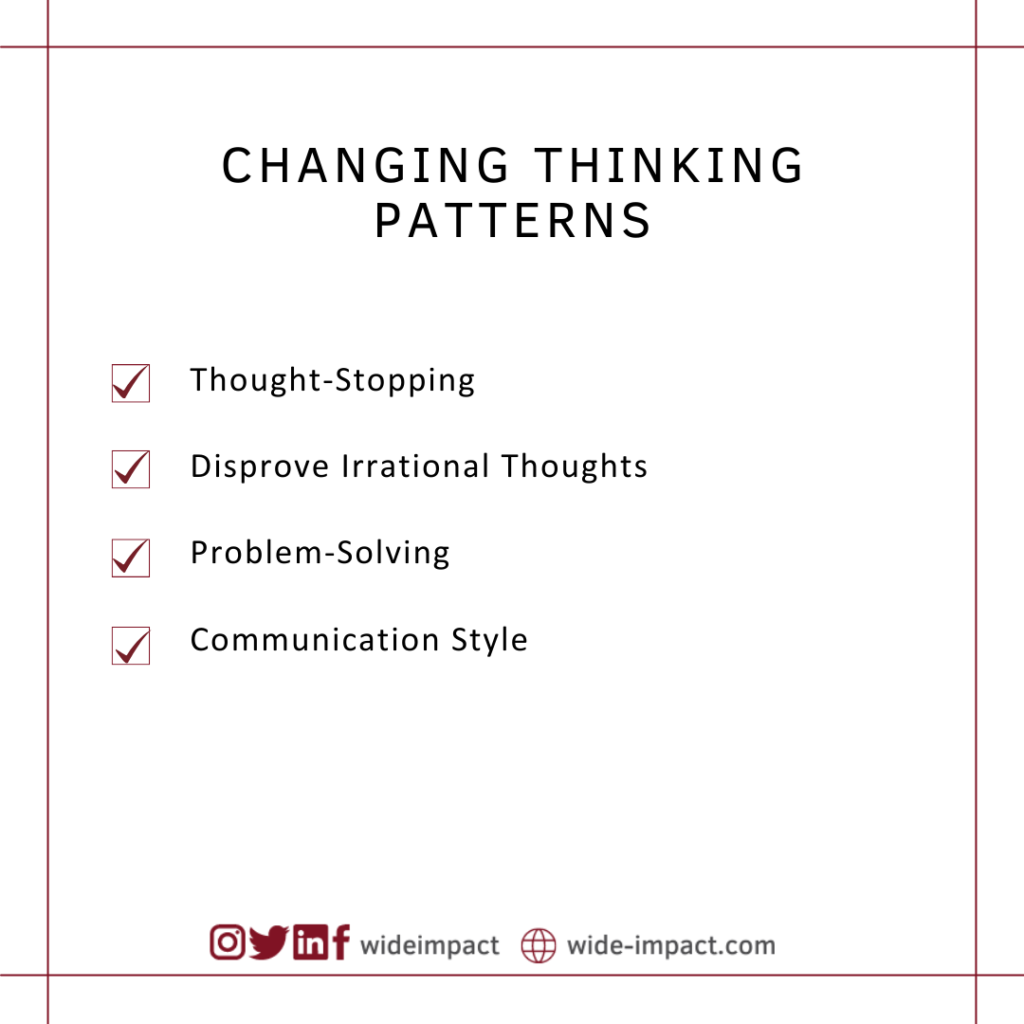
- Thought-Stopping: When you notice a negative thought creeping in, practice thought-stopping techniques to interrupt its progression. Replace the negative thought with a positive affirmation or a mental image that brings you comfort and calmness. This simple yet powerful method can help break the cycle of negativity and alleviate stress.
- Disprove Irrational Thoughts: Challenge irrational thoughts by examining the evidence and questioning their validity. Avoid catastrophizing or magnifying the negative aspects of a situation. Instead, focus on realistic and rational interpretations, which can help reduce anxiety and promote a sense of control.
- Problem-Solving: Take a proactive approach to stressful situations by engaging in problem-solving techniques. Break down the problem into smaller, more manageable steps, and brainstorm potential solutions. By identifying practical strategies and taking decisive action, you can regain a sense of empowerment and reduce stress levels.
- Communication Style: Pay attention to your communication style and its impact on your stress levels. Practice assertive communication, which involves expressing your thoughts and feelings in a clear, respectful manner while also considering the needs of others. Avoid passive or aggressive communication styles, as they can contribute to misunderstandings and escalate stress levels.
Stress doesn’t discriminate – whether you’re glued to a desk like me or on your feet all day, it can creep into your life in unexpected ways. Sitting for extended periods can be surprisingly stressful, even if it’s just using our hands to do the talking. But fear not! We all have our unique ways to relieve stress. Whether you’re the mail guy, a CEO, or a busy parent juggling work and family, stress is an unwelcome visitor we’d all love to banish from our lives. So, let’s explore practical strategies to kick stress to the curb and reclaim our peace of mind, no matter our role or routine.


